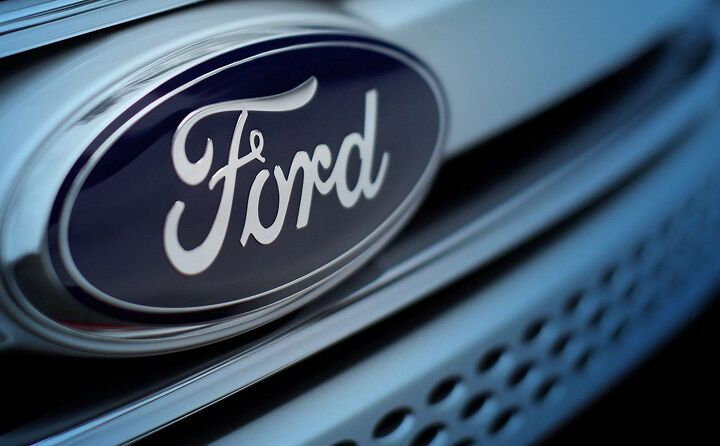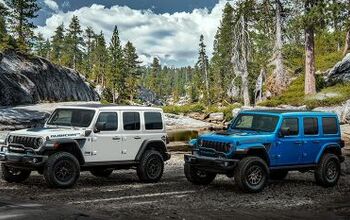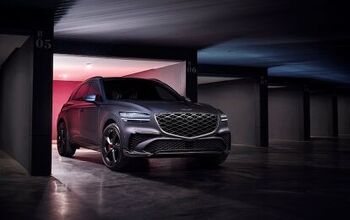Ford Has a Few Pointers for Trump as NAFTA Negotiations Loom

Ford Motor Company thinks it has the answers for the impending renegotiation of the North American Free Trade Agreement. Joe Hinrichs, Ford’s president of the Americas, believes the key to an updated NAFTA includes protections against currency manipulation and the standardization of product regulation between the United States, Canada, and Mexico.
Of course, Hinrichs is just one voice of many. Despite his initial threat of NAFTA’s abolishment failing to pan out, President Trump has maintained a hardline stance — stating he will negotiate a better deal for the U.S. (or pull out if he can’t). Meanwhile, Democratic Senator Sherrod Brown has urged for transparency throughout the process while echoing some of Trump’s campaign promises to stick up for American jobs by not showing favoritism or allowing industries to play against each other.
By contrast, Hinrichs’ proposals are specifically focused on streamlining the auto industry and avoiding long-standing complications associated with financial witchcraft.
Speaking to Automotive News, Hinrichs said he would like to see his ideas make it into the prospective overhaul of NAFTA and serve as a blueprint for future trade deals. “We can, as a country and region, provide some good templates and examples for the future of trade agreements beyond the NAFTA region,” he explained. “I think, in the end, the people involved know what’s at stake here and we’ll clearly end up somewhere that will make sense for the U.S. and the industry.”
“We don’t know how it will play out,” Hinrichs said. “It’s our belief — and I think the industry’s belief — that the integration of the North American auto business has certainly served the North American continent well relative to its competitiveness vs. the rest of the world, and that’s important for all of us to remember.”
While Ford has been fairly vocal about currency manipulation in regard to the defunct Trans-Pacific Partnership, it doesn’t seem to be worried about it within North America. The provisions in NAFTA to protect against it really only serves to set a good example for more global trade agreements.
“Traditionally we don’t see the Canadian dollar or Mexico peso being manipulated by the government, but we believe trade agreements should incorporate mechanisms around currency manipulation and the like,” Hinrichs explained.
He didn’t say it, but we all know which Far East People’s Republic the industry is most concerned with in respect to economic voodoo. As for the amalgamation of vehicle standards, that’s as clear as it gets. Automakers don’t want to waste time and money adhering to differing safety and build standards between countries.
General Motors, like Ford, would also like to see the deal result in smoother sailing for manufacturers. “We want a balanced playing field,” said CFO Chuck Stevens last week. GM also supports simplifying local content and origination rules. However, if the deal changes in a matter that increases the cost of imported items, Stevens said he’s “hopeful there would be a period of transition so we can adjust to it.”
[Image: Ford Motor Co.]

A staunch consumer advocate tracking industry trends and regulation. Before joining TTAC, Matt spent a decade working for marketing and research firms based in NYC. Clients included several of the world’s largest automakers, global tire brands, and aftermarket part suppliers. Dissatisfied with the corporate world and resentful of having to wear suits everyday, he pivoted to writing about cars. Since then, that man has become an ardent supporter of the right-to-repair movement, been interviewed on the auto industry by national radio broadcasts, driven more rental cars than anyone ever should, participated in amateur rallying events, and received the requisite minimum training as sanctioned by the SCCA. Handy with a wrench, Matt grew up surrounded by Detroit auto workers and managed to get a pizza delivery job before he was legally eligible. He later found himself driving box trucks through Manhattan, guaranteeing future sympathy for actual truckers. He continues to conduct research pertaining to the automotive sector as an independent contractor and has since moved back to his native Michigan, closer to where the cars are born. A contrarian, Matt claims to prefer understeer — stating that front and all-wheel drive vehicles cater best to his driving style.
More by Matt Posky
Latest Car Reviews
Read moreLatest Product Reviews
Read moreRecent Comments
- Dartman https://apnews.com/article/artificial-intelligence-fighter-jets-air-force-6a1100c96a73ca9b7f41cbd6a2753fdaAutonymous/Ai is here now. The question is implementation and acceptance.
- FreedMike If Dodge were smart - and I don't think they are - they'd spend their money refreshing and reworking the Durango (which I think is entering model year 3,221), versus going down the same "stuff 'em full of motor and give 'em cool new paint options" path. That's the approach they used with the Charger and Challenger, and both those models are dead. The Durango is still a strong product in a strong market; why not keep it fresher?
- Bill Wade I was driving a new Subaru a few weeks ago on I-10 near Tucson and it suddenly decided to slam on the brakes from a tumbleweed blowing across the highway. I just about had a heart attack while it nearly threw my mom through the windshield and dumped our grocery bags all over the place. It seems like a bad idea to me, the tech isn't ready.
- FreedMike I don't get the business case for these plug-in hybrid Jeep off roaders. They're a LOT more expensive (almost fourteen grand for the four-door Wrangler) and still get lousy MPG. They're certainly quick, but the last thing the Wrangler - one of the most obtuse-handling vehicles you can buy - needs is MOOOAAAARRRR POWER. In my neck of the woods, where off-road vehicles are big, the only 4Xe models I see of the wrangler wear fleet (rental) plates. What's the point? Wrangler sales have taken a massive plunge the last few years - why doesn't Jeep focus on affordability and value versus tech that only a very small part of its' buyer base would appreciate?
- Bill Wade I think about my dealer who was clueless about uConnect updates and still can't fix station presets disappearing and the manufacturers want me to trust them and their dealers to address any self driving concerns when they can't fix a simple radio?Right.


































Comments
Join the conversation
To make the US competitive in the global auto industry Trump needs to restructure all imposts that are making the US auto industry less competitive rather than tugging at the populist "bringing the jobs back to America" theme. US vehicles are not competitive overall in the global market. Blaming Mexico or even the Canadians is incredibly niave. I can't believe Trump's bullsh!t stance on dairy. The US dairy industry is like it comes from Cuba. The dairy farmers are heavily subsidised. Reduce the number of farmers rather than the welfare dairy industry you guys have. The US auto industry is already subsidised over $3000 a vehicle! And the cost will rise even more with any changes that Trump makes to NAFTA. Even a socialise Germany subsidises $1300 per vehicle.
Write to your representative and vote. They're the only things that matter.